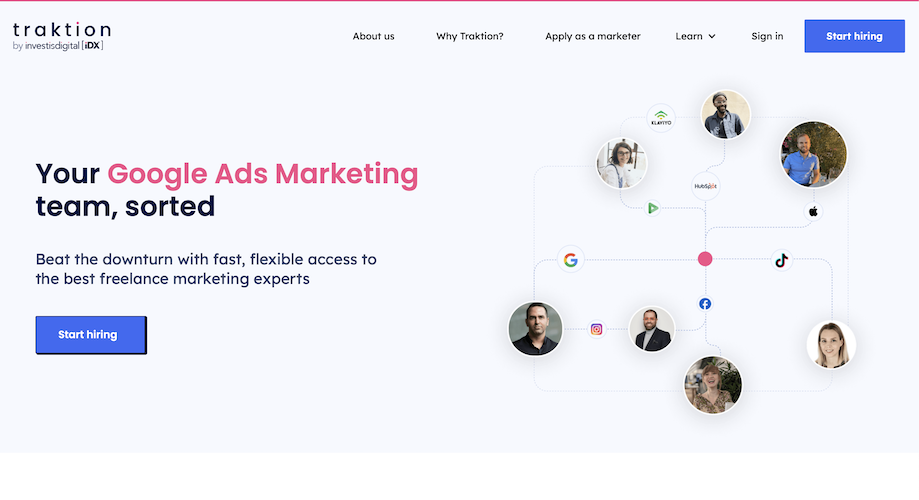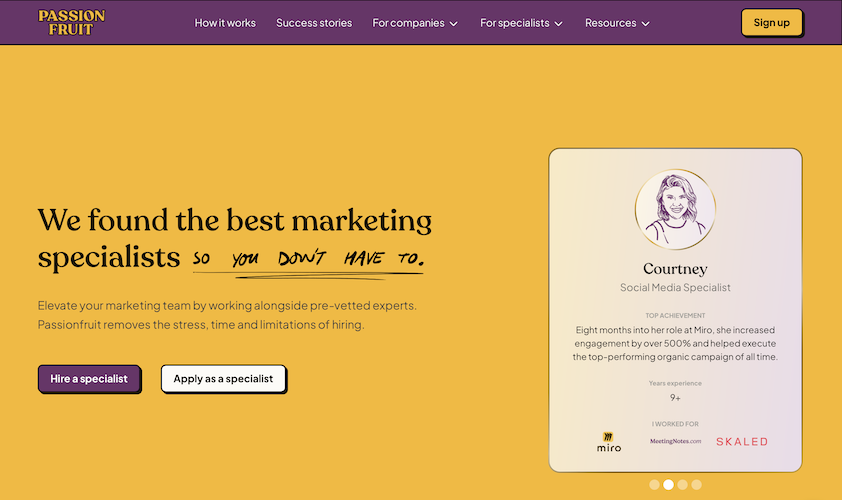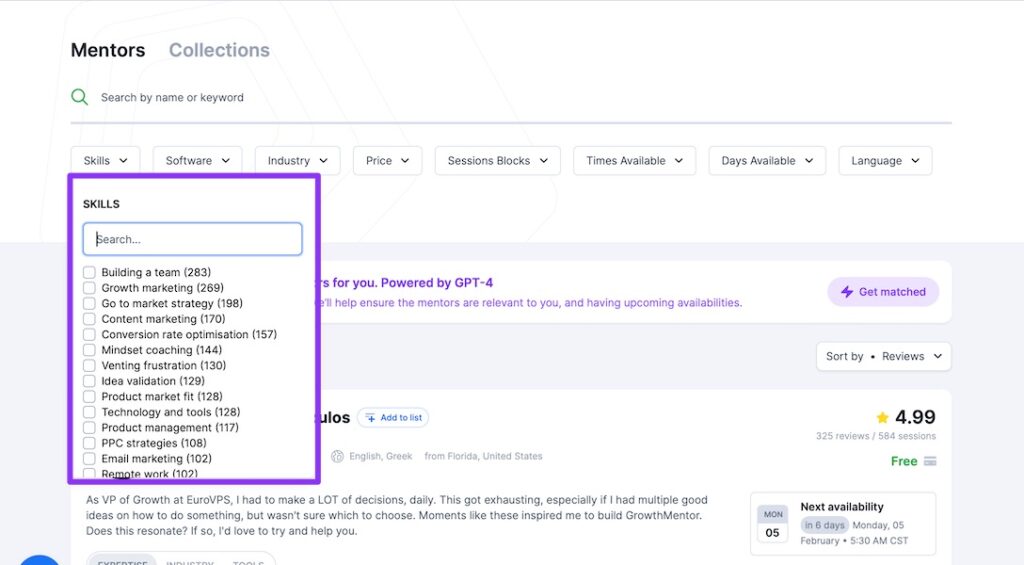Is Hiring a Marketing Consultant The Right Move for Your Startup?
If your startup’s marketing is maxed out, it may be time to consider hiring a marketing consultant.
If it feels like your startup’s marketing capacity is stretched thin, you may be considering adding a new full-time or part-time marketer to your team.
However, there is another option that could be more cost-effective, both for your hiring budget and for your marketing ROI. And that’s hiring a marketing consultant.
No clue where to get started? Don’t worry, we’re here to help. Keep reading for the complete guide to when, why, and how you should hire a marketing consultant.
What’s a Marketing Consultant?
When it boils down to it, a marketing consultant is very much like a freelance marketer. However, marketing consultants do tend to be more experienced marketers with at least 3-5 years of marketing under their belt. But, they typically work on a part-time or contract basis and work with multiple clients at any one given time, much like freelancers.
If you’ve explored this realm at all, you’ve also probably heard the term “fractional marketer.” This is usually most common in the case of “fractional CMOs.”
It’s the exact same principle as a marketing consultant, simply known under a different name. One might even say “fractional” is the rebranded version of “consultant.”
What Do Marketing Consultants Do?
Marketing consultants take a “done for you” approach by carrying out marketing projects within their specific niches of expertise.
That means that “what they do” will completely depend on the project you’re hiring for.
But, if you’re curious about specifics, here are some of the most common areas you’ll see consultants advertise:
- Growth marketing: Includes building growth marketing strategies, executing channel experiments, conducting A/B tests on marketing materials, and testing and iterating on acquisition loops. This arena is a newer subsection of marketing and has gained popularity within the last five years or so.
- SEO: Includes developing a company’s SEO strategy, conducting technical SEO audits, analyzing which keywords businesses should produce content for, and sometimes managing a team of SEO writers (which gives it a good bit of overlap with content marketing below)
- Content marketing: Includes creating a company’s content strategy, auditing a business’s current content offerings, developing and testing ideas for new content campaigns, and executing content campaigns primarily via social media and SEO channels. Depending on the role, it may also include managing a team of writers and some of the duties of SEO consultants (more in the context of SEO-optimized content) listed above.
- Social media marketing: Includes producing content distributed on organic social channels, managing social communities, responding to comments and messages delivered through organic social platforms, and monitoring platforms for social mentions of the company. Occasionally, duties may overlap with PPC marketing below. Depending on the role, social media marketers may function more like a community manager, a customer experience manager, or a content creator.
- PPC: Includes creating, managing and reporting on ad campaigns for any of the paid ad platforms, including (but not limited to): Facebook, X (Twitter), TikTok, Reddit, Google, Youtube, and LinkedIn. PPC marketers also perform paid ad keyword research, track ad campaign conversions, and optimize landing pages.
- CRO: Includes any duties related to conversion rate optimization, such as UX evaluations and improvements, funnel optimization, landing page and CTA optimization, form optimization and personalization strategies. These marketers may also specialize in growth marketing as the skill-sets do overlap.
- Brand marketing: Includes management of brand identity, development and execution for brand awareness campaigns, PR and brand monitoring, events and sponsorship management, and consumer research. Often, brand marketers have heavy overlap with both PR specialists and partnership marketing specialists.
- Email marketing: Includes email list management, planning, execution and reporting on email campaigns, automation strategies, content development, segmentation and targeting, and A/B campaign testing. Some email marketers will eventually expand their skills to cover the end-to-end customer journey, in which case they’re lifecycle marketers. Email falls under lifecycle marketing management as a major tool, but it’s one specialty of many.
- Marketing analytics: Includes any responsibilities related to marketing data, such as market research, marketing campaign performance analysis, customer segmentation, A/B testing, dashboard development, and data reporting and forecasting. Think of this as a data analyst who specializes solely in marketing.
- Affiliate and/or influencer marketing: Includes developing relationships with affiliates and influencers, creating, managing and reporting on content campaigns utilizing “UGC” (we use the term in quotes as affiliates and influencers can be users of a product, or they can be paid ambassadors) from those affiliates and influencers, and identifying new trends. It’s easiest to think of this as a combination of a social media and a partnership role.
As you can tell, there are a ton of different niches and even overlap between those niches. Short of a few technical-heavy specializations like marketing analytics and technical SEO, marketers today are generalists, meaning one marketer will have skills in a group of (often related) areas.
Growth marketers often have skills in CRO and a non-specialist level of marketing analytics, social media marketers are likely also comfortable with partnership and affiliate or influencer marketing, and content marketers will often work in copywriting, social media, and SEO realms as well.
Therefore, when it comes to hiring a consultant, don’t feel you have to constrain yourself to a single project or niche. It’s good practice to start by hiring for one project or area at a time (after all, anyone might be taken aback by being handed a portfolio of projects). But you can always talk to your marketing consultant about your business’s needs and determine if they are a good fit for multiple marketing activities.
When Should You Hire a Marketing Consultant?
Unlike hiring a growth consultant, you can hire a marketing consultant at any stage in your startup journey.
However, marketing consultants are typically most effective when you’ve completely exhausted the skills or capacity of your current team.
You might want to hire a marketing consultant under the following circumstances:
- You’re expanding to a new marketing channel but are not yet confident enough in ROI to hire for a full-time role
- Your current marketing team is at capacity
- You’re a solo-founder or part of an ultra-small team and wearing too many hats, including marketing
In these cases, a marketing consultant can help take some of the workload and thus reduce the stress on you or your team. So while the value may be partly measured in ROI on marketing channels, it can also be looked at as value in freeing up you or team members to work on other value-driving projects as well.
How to Find a Good Marketing Consultant
If you’re convinced hiring a marketing consultant is a good move for your business, you’ll want to know how to find the good ones and not waste time on so-called “marketing experts” with no real experience.
Fortunately, you have plenty of possibilities. Let’s walk through some of your options:
Your Network
This is the first stop we always recommend for finding consultants: check with your network. Often, asking your local or LinkedIn network for introductions is a great way to find a consultant you can trust. However, as with any network connections, we always recommend doing your own research and vetting as well.
You can also vet possible marketing consultants through their content. Simply look for marketers within the niche you want to hire for and follow them on LinkedIn or other platforms. If their content resonates with you, you can see if they have marketing consulting services available. (Which is true more often than not as most content creators are building personal brands or businesses.)
Marketing Agencies
Some may find this more of an old-fashioned route, but marketing agencies are still around for good reason.
Most agencies today are specialized boutiques rather than large one-stop-shops, so you can easily pick out an agency that specializes in the area you’d like to hire for. Chances are if they’ve helped plenty of founders in your niche, they’ll be able to help you as well.
Simply make sure to validate you’re part of the agency’s target customer base and ensure the amount of interaction, your company’s hands-on involvement, and processes match with your expectations of a consultant.
MarketerHire
Price: For their minimum 10 hour package, rates range from $3000-$6000, depending on expertise. They do state they do not charge hiring businesses placement, termination or long-term contract fees.
Payment Plan Options: Hourly package rate
Vetted?: Yes, viewable on their website.
Matching Services Provided?: Yes
Marketer Profiles Viewable On Site Without Signup: No.
MarketerHire is a platform that specializes in connecting businesses with freelance marketers and marketing assistants.
Their current specialties include Amazon marketing, brand marketing, CMOs, content marketing, email marketing, marketing analysis, growth marketing, PPC, social media, SEO, and programmatic marketing.
Traktion
Price: Freelancer rates are not advertised on their site. However, Traktion states in their FAQ they make money via a flat commission fee from freelancer earnings and do not charge fees to hiring businesses.
Payment Plan Options: Not advertised
Vetted?: Yes, viewable on their website.
Matching Services Provided?: Yes
Marketer Profiles Viewable On Site Without Signup: No.
Traktion is another marketer hiring platform, under the umbrella of Investis Digital.
While hiring specialities are not listed on their website on the business hiring side, their application page for marketers says:
“We have marketers with the following expertise: Paid Social, PPC, Search Engine Optimisation, Content Marketing, App Store Optimisation, Conversion Rate Optimisation, Customer Relationship Management, Amazon Ads, Growth Strategy, Affiliate Marketing and Programmatic Ads.
We also look for marketers who don’t fit nicely into a box which may include: CMOs (including part-time CMOs or Fractional CMOs), Growth marketers, Graphic designers, Project Managers, Account Managers, Campaign Managers, Brand Managers, Creative Directors.”
PassionFruit
Price: Freelancer rates and other fees are not advertised on their site
Payment Plan Options: Not advertised
Vetted?: Yes, viewable on their website. Passionfruit cites a 12% talent acceptance rate.
Matching Services Provided?: Yes
Marketer Profiles Viewable On Site Without Signup: Not exactly. There are case studies available, but they do not list the full profile of the marketer.
Passionfruit primarily focuses on marketing and design experts and cites a low final talent acceptance rate.
Their marketing specialties include mobile app marketing, copywriting, CRO, CMO, growth marketing, brand strategy, content marketing, product marketing, SEO, PR, PPC, and social media.
GrowthCollective
Price: Growth marketer rates range $50-$150+/hr, and GrowthCollective states in their FAQ they make money via a flat commission fee from freelancer earnings and do not charge fees to hiring businesses.
Payment Plan Options: Weekly or monthly pricing
Vetted?: Yes, viewable on their website.
Matching Services Provided?: Yes
Marketer Profiles Viewable On Site Without Signup: No. Previews of profiles are available, but require a sign-up to view.
GrowthCollective is another marketing focused hiring platform that cites fast hiring as their main advantage.
Their available specialities include PPC, CMOs, social media, SEO, marketing analytics, affiliate marketing, influencer marketing, programmatic media buying, email marketing, content marketing and marketing automation.
GrowthExpert
Price: Growth manager rates range from $500-$2000 per month on monthly retainer (or an alternate $50-$125/hr block of hours option), and growth leadership rates range $1000-$2000 per month on monthly retainer (or an alternate $125-$300/hr block of hours option). GrowthExpert does not charge fees to hiring businesses or take a commission from experts hired through the platform.
Payment Plan Options: Hour blocks, monthly retainers, or long-term contracts
Vetted?: Yes, which you can read here. GrowthExpert has a .5% acceptance rate for talent.
Matching Services Provided?: Yes
Marketer Profiles Viewable On Site Without Signup: Yes. Profiles are anonymized, but list the full expertise of the marketer without requiring a signup.
Now, maybe you’re interested in hiring other kinds of consultants outside of marketing. Maybe you need folks in product, sales, or growth. Do you really want to lock yourself in to a marketing-only hiring platform?
This is exactly why we created GrowthExpert.
At GrowthExpert, you get the same strict double-vetting process we apply here at GrowthMentor, but for fractional talent you can hire by hour blocks, monthly retainers, or extended contracts. You can even hire entire plug-and-play growth teams that are ready to roll within 48 hours.
Unlike other platforms, GrowthExpert focuses on more than just marketing talent. So while we can fill your needs for marketing roles like a CMO, a growth marketer, a head of SEO, or a head of content, we can also help you hire for roles like a head of growth, a VP of sales, or a growth product manager, we’ve got you covered.
And did we mention it’s free to post your job?
Getting started is simple. All you have to do is post your job, and if it’s a good fit for our talent pool, we’ll share it with them. Interested experts can request an intro and we’ll introduce both parties. If it’s a good mutual fit, you’ll work with the expert the same way you would any other contractor.
There are no commission, no fees. You can learn more about why in GrowthExpert’s manifesto.
Or, if you’re sold, schedule a call to get matched to the marketing consultant you need.
When a Mentor Might be a Better Fit
Now, though the right time to hire a marketing consultant is looser than the timeframe for hiring growth consultants, there are some scenarios where your company may not be ready for a consultant.
Maybe you’re uncertain if it’s worth the cost of a contract for the potential ROI on a new channel. Maybe you feel someone on your team might be capable of taking a certain marketing project on; they simply need a couple of months to either up-skill or wrap-up current projects.
The great news? There’s another option: you can chat with a marketer who mentors.
You won’t have to be locked into a (potentially expensive) contract and you can start exploring the marketing waters as well.
Plus, since mentors tend to teach mentees “how to” instead of the “do it for you” approach of a consultant, you or your team members have the chance to learn skills for yourself.
Fortunately, there are plenty of marketers who mentor. It’s merely a matter of narrowing by the specialty you need.
But unfortunately, if you’ve looked into consultants, you likely don’t have a ton of time to search for and build a relationship with a potential mentor.
Thus, we recommend skipping all that by joining GrowthMentor.
We specialize in connecting marketers and founders with some of the top marketing talent in the business.
Just look at our skills filter on the browse mentors page, which includes these marketing areas:
- Growth marketing: 268 mentors list as expertise
- GTM strategy: 198 mentors listed
- Content marketing: 169 mentors listed
- CRO: 157 mentors listed
- PPC: 108 mentors listed
- Email marketing: 102 mentors listed
- SEO: 91 mentors listed
- Marketing automation: 90 mentors listed
- Product marketing: 56 mentors listed
- Social media: 56 mentors listed
- Copywriting: 55 mentors listed
Which means you can get a vast array of opinions, even within the same marketing niche. On top of that, you can start talking with a mentor the same week you join and get the insights you need faster.
You could chat with mentors like…
Our Marketing Mentors

Growth Coach
Mentoring Style: The coach. Will provide actionable ideas for steps you can take to face your challenge in an energetic, confidence-boosting manner.
Book A Call With Daphne If:
- You need a data driven approach to growth marketing and CRO.
- You’re building a marketing team from solo or ultra-small to a mid-sized team.
- You’re an agency owner who needs a well-rounded perspective on multiple marketing arenas.
- You’d like for your mentor to have an open, positive, and thoughtful approach and ask you lots of questions to help give you clarity.

Mentoring Style: The engineer. You want someone who will break down your marketing into components and show you how and why they all work together.
Book A Call With Yiz If:
- You’re a technical founder craving a more engineering-flavored understanding of marketing.
- You need help with marketing automation.
- You’re interested in a data-driven and growth-marketing-minded approach to content marketing.
- You’re looking for a hyper-curious mentor who can help you both zoom out to the big picture and zoom in to cover specific details of your marketing motions.

Head of B2B Marketing@Zattoo, scaleup advisor, repeat founder, compulsive helper
Mentoring Style: The inventor. Will ask lots of questions to understand your mindset and approach, then prompt you with innovative ideas and fresh approaches.
Book A Call With Hanns If:
- You need a solid grounding in the B2B marketing space.
- You want a mentor with marketing experience both from the founder side and the marketer side.
- You need a very well-rounded mentor with experience across a broad range of marketing niches.
- You’d like for your mentor to shoot straight and provide out-of-the-box ideas, all while being patient in helping you refine your understanding of the challenge.

CMO at Mira | DTC, e-commerce, building brands, growth, automation 🏄♀️
Mentoring Style: The architect. Will examine your challenge through multiple lenses, request background information before the call, and produce tons of actionable advice you can follow as a blueprint.
Book A Call With Katherine If:
- You’re in the DTC and eCommerce space and need a CMO’s take on marketing.
- You’d like to talk about brand marketing, but from a data-driven perspective.
- You want to build a high performing marketing team and processes that help, rather than hinder, the team.
- You want an insightful, friendly mentor who’s also going to pack every session with actionable advice and go above and beyond in the preparation phase.
So, for the largest selection of marketing mentors available, join GrowthMentor.










